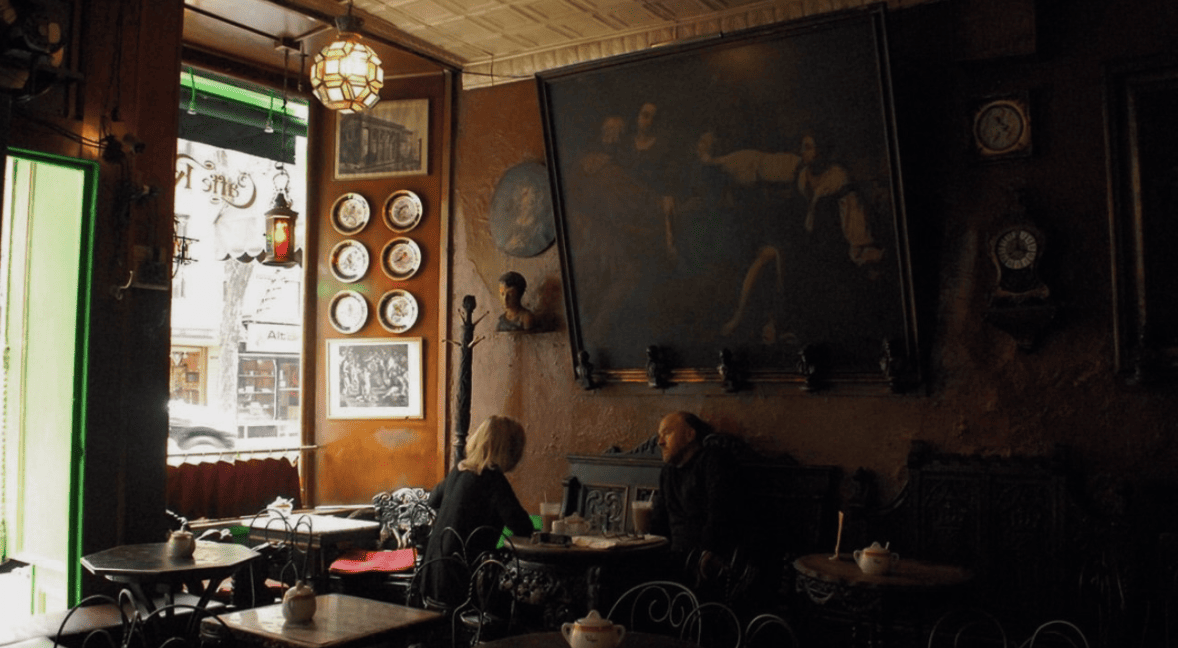Should you find yourself an immigrant, or, at least, an internal immigrant—let’s say, your hearth has been disrupted, or you didn’t grow up with a warm, fuzzy feeling of belonging to one particular identity marker or location—you might be on a perpetual journey of seeking that feeling, writing of home as a set of sensations, as syncopated quarter notes, home as the feeling of being foreign in yet another setting. Home as something that happens, not exists.
It might be preserved in the scattered memories of a small music school classroom—two pianos, three chairs, patches of reflected light through the faded Soviet curtains, windowsill filled with houseplants that have seen generations of Tchaïkovski wannabes, and your teacher, who never raised her voice upon too many mistakes and frivolities of her students, instead resorting to an oddly effective nonchalance: “I’m going outside to smoke а cigarette. You have two minutes to get this right.”
There’s a metaphysical concept in Spanish describing a place from which one’s strength is drawn: querencia. It stems from the verb querer, which means “to desire.” In his book Death in the Afternoon, Ernest Hemingway mentioned querencia in the context of bullfighting, as a place in the ring that the bull associates with home and gravitates to in order to regain his strength. Curiously, it doesn’t exist right away, but develops in the bull’s brain as the fight goes on. More recently, the concept has been mentioned in a New York Times article on wildfires in New Mexico: when describing her community’s persistence, one of the residents attributed it to their querencia, defining it as “a cultural longing, a pull, that keeps us there.”
I made a mental map of my own querencia spots: Caffe Reggio in the West Village. Courtyards and bridges in St. Petersburg. Bookstores, trams, friends’ bedrooms. Then I moved on to querencia memories. Watching my stepfather make pancakes on a December morning. Making tea in the backroom before rehearsals in my bilingual theater on the Upper West Side. Walking through the white nights two summers ago. Hearing my English teacher sing “Skinny Love” on ukulele in class the day before Thanksgiving. The mental map of places and memories is bound together with music I had listened to at the time, allowing me to travel back to a particular querencia moment when I need to.
Lately I’ve been noticing more and more of these moments as they occur. Fewer shallow breaths, more free rhythms. I smile at the thought. I know I’m finding querencia within.
After immersing myself in my new Reims context, my querencia spots and memories have been layering and evolving into querencia rituals. Feeling the cold air redden my cheeks as I step out of my 8:50 pm class every Thursday. Watching coffee occasionally boil over the cezve before I manage to take it off the heat, just like it did when I was crashing on my buddy’s couch during the last months of high school. My neighbors gathering on the carpet of my apartment here, to click-clack at their laptops’ keyboards or improvise a communal dinner.
Sometimes, belonging comes instantaneously: you meet someone, you move somewhere, you cut your hair, you start writing, and it just feels right, right away. Or sometimes, there’s no fuzzy warmth at first sight, and you have to trust the percolating process to brew something worth waking up for. You have to make an appeal to your inner Ernest Hemingway and think about the bull developing his querencia as his fight goes on; neither growing devastated at its absence when it begins, nor convincing yourself that if something doesn’t feel like home instantly, it never will.
Life’s richest experiences exist outside your comfort zone, and leaning into discomfort of possible failure, or just the terrifying thrill of new, is key to discovering new hearths. Sometimes leaning into discomfort means allowing yourself to be comfortable without second-guessing every good thing that happens: accepting a dinner invitation, or making plans without mentally orchestrating all the ways things could go wrong; stumbling into something invigorating and life-affirming that would turn jitters into the excitement of diving into the unknown. External querencia without the internal one is invigorating but fleeting—allowing yourself to find it within takes patience and trust. In my experience, it paid off a lot of unexpected dividends.
Works Cited
- Romero, Simon. “New Mexico Wildfire Is ‘Burning Down a Way of Life.’” The New York Times, 6 May 2022, www.nytimes.com/2022/05/05/us/new-mexico-wildfires.html.
- Hemingway, Ernest. Death in the Afternoon. London, Cape, 1950.
Other posts that may interest you:
- Local Victories for Turkish Opposition — A Sign of Hope?
- Are France and Japan a Mismatch Made in Heaven?
- Mes yeux sont comme cette île
- A Reflection on Dark Tourism
- Cadavre Exquis : Goodbye stranger
Discover more from The Sundial Press
Subscribe to get the latest posts sent to your email.





